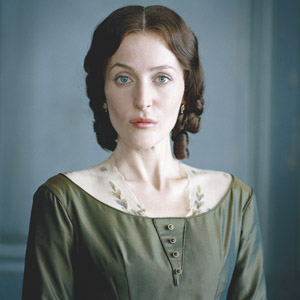![[Metroactive Movies]](/movies/gifs/movies468.gif)
[ Movies Index | Show Times | Silicon Valley | Metroactive Home | Archives ]
Kill All the Lawyers
Masterpiece Theatre negotiates the legal labyrinth of Dickens' 'Bleak House' in a magnificent miniseries
By Michael S. Gant
WHAT IS Gillian Anderson, a.k.a. Special Agent Dana Scully, doing in the new Masterpiece Theatre adaptation of Bleak House? Anderson holds her own as the weary-of-soul Lady Dedlock, but she seems a bit out of her range surrounded by the best British character actors the BBC has at its beck and call—and in a part played by Avenger Diana Rigg 20 years ago in the last Masterpiece Theatre go at Dickens' hydra-headed novel.
Then, about halfway through the eight-hour miniseries (which begins Jan. 22), comes The X-Files moment that justifies Anderson's presence. The gin-swilling landlord (improbably named English standup Johnny Vegas) of a rag and bottle shop is discovered dead, leaving behind little more than particles of greasy soot. His demise is determined to be "inborn, inbred, engendered in the corrupted humours of the vicious body itself, Spontaneous Combustion," as Dickens explains.
A case for Mulder and Scully, indeed. (And, indeed, the pair investigated several purported instances, including a Season 1
episode about a "telekinetic assassin.") Dickens himself was derided for his pseudoscience; he responded with assurances that he had delved deep into the subject. One of his sources was believed to have been an 18th-century account of a Frenchman acquitted of murdering his alcoholic wife when the court determined that she had burned up from the inside out.
The landlord's death is an important tributary feeding the mighty river of Bleak House's plot, but the quirky circumstances of his passing demonstrate how much digressive detail Dickens packed into his novel (published in installments in 1852 and '53)—and how much judicious culling screenwriter Andrew Davies had to perform to distill nearly 900 pages into eight hours and six episodes relating the tangled tale of Jarndyce and Jarndyce, an inheritance dispute that has metastasized into a legal cancer, providing endless profitable labor for lawyers and dashing the dreams of several generations of Jarndyces.
The TV Bleak House has no visual equivalent for the novel's famous opening passage—a literary tracking shot through the fog-shrouded streets of London leading to the High Court of Chancery where Jarndyce and Jarndyce is forever delayed, to the despair of the participants. Instead, Davies briskly introduces the parties in the matter, who cannot free themselves from J. v. J. even if they are willing to forgo all claims in it.
Wards of the court Ada Clare (Carey Mulligan) and Richard Carstone (Patrick Kennedy), along with an orphaned Miss Esther Summerson (Anna Maxwell), have been remanded to the graces of John Jarndyce (Denis Lawson, who played Wedge Antilles in the original Star Wars), owner of Bleak House. Nearby reside the elderly Sir Leicester Dedlock (mutton-chopped Timothy West) and his younger—and very mysterious—wife, Lady Dedlock, who bears a striking resemblance to Miss Summerson (or so we are led to believe, although Anderson and Maxwell look nothing alike).
The parasites attaching themselves remoralike to the case include the solicitors of Kenge and Carboy, the transcriber Mr. Snagsby (who runs a sort of Victorian Kinko's), a law writer named Nemo, whose death sets the whole clockwork mechanism into motion, and law clerk Mr. Guppy (Burn Gorman, whose insinuations recall Crispin Glover at his most unctuous), a striver who has taken a shine to Miss Sommerson.
Most memorable of all in a uniformly excellent cast is Charles Dance as the sinister lawyer Mr. Tulkinghorn, who first perceives how valuable a commodity to Lady Dedlock the real identity of the law writer might be. Dance has a lot of British TV roles on his résumé, but is most familiar to American audiences from Gosford Park and Alien³. With a penetrating stare and hauteur to burn, Dance dismisses underlings with a flick of the tongue while subtly jobbing the gentry. He takes pleasure in ruining a man for no other reason than "I can." He exactly embodies Dickens' description of "an Oyster of the old school, whom nobody can open." No one on American TV comes close to Dance in clench-jawed villainy, except perhaps William Fichtner's alien sheriff on Invasion.
This adaptation tightly holds a skein of plots and characters with admirable clarity. Even with its eye on the final prize of familial revelations, the series has time to consider some all-important peripheral characters, especially the tragic Mr. Gridley (Tony Haygarth), who is driven to impotent rage and finally death from the "sickness of hope deferred" by the mill-grinding slowness of the Chancery Court.
In Gridley, we can see the beginnings of Kafka's K., from The Trial, who spends his life before an unnamed court trying to clear his name of charges never stated. Out of Dickens' attention to detail grew Kafka's universal absurdity of a system in which merely protesting our innocence is proof of our guilt—which sounds a lot like how the Bush wants to run the NSA.
[ Silicon Valley | Metroactive Home | Archives ]
Copyright © 2006 Metro Publishing Inc. Metroactive is affiliated with the Boulevards Network.
For more information about the San Jose/Silicon Valley area, visit sanjose.com.
![]()

An Exhausted Deity: Gillian Anderson plays the mysterious Lady Dedlock in 'Bleak House.'
Bleak House, a BBC/WGBH production, runs Sundays at 9pm from Jan. 22 to Feb. 26 on PBS affiliate stations.
Send a letter to the editor about this story to letters@metronews.com.
From the January 18-24, 2006 issue of Metro, Silicon Valley's Weekly Newspaper.